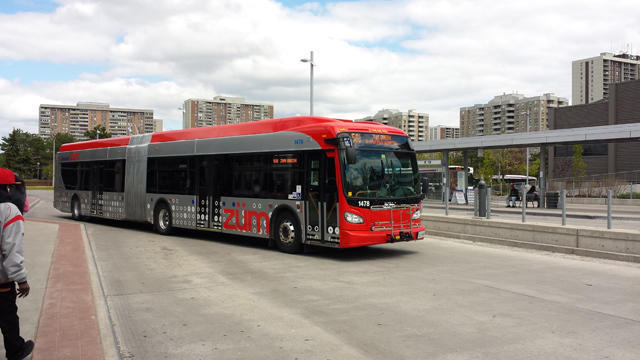Should Brampton Transit Enforce Routine Drug Testing for Drivers?
Published May 12, 2017 at 5:18 pm

Although everyone knows that drinking on the job is frowned upon, imbibing is even more discouraged–and for good reason–when your job involves operating a motor vehicle of any kind (particularly
Although everyone knows that drinking on the job is frowned upon, imbibing is even more discouraged–and for good reason–when your job involves operating a motor vehicle of any kind (particularly a large one that carries multiple passengers).
Last month, we learned that a GO Bus driver was arrested for impaired driving at the Square One GO Transit terminal in Mississauga on the night of April 7. Even more recently, the Toronto Transit Commission (TTC) announced that two employees failed tests that are part of its newly expanded drug and alcohol testing policy.
Although it appears that intoxication of public transportation drivers is rare, the GO Bus incident (which Metrolinx spokesperson Anne Marie Aikins said was the first incident of its kind for GO Transit) and the failed TTC tests beg an important question: Should all drivers be subjected to random drug and alcohol checks?
While not everyone is on board with the idea, the troubling TTC and GO incidents have some residents wondering if mandatory testing should be enforced across the province. The TTC announcements came very shortly after the major transit organization launched its brand new program–one that was challenged, but ultimately held up, by the courts in April.
So, will other transit organizations such as Metrolinx, Brampton Transit and MiWay get on board?
According to a recent CityNews report, Metrolinx does not–nor does it appear to have any plans to–randomly test drivers for recent drug and alcohol use. In a statement to the media outlet, a Metrolinx spokesperson said that, in the event of a collision, the police will investigate and test for drug or alcohol use as necessary.
However, Metrolinx told CityNews that testing could be administered anytime, such as part of pre-employment processes, post accident/incident, when a driver returns to duty, in instances where there is suspicion of impairment and during follow-up or periodic physicals.
As for Brampton’s neighbour Mississauga, Director of Transit Geoff Marinoff said the city does not test its drivers.
“The city’s transit provider MiWay does not have a drug and alcohol testing program,” Marinoff said in an email statement.
As for Flower Town, the City of Brampton told CityNews that it does not have plans to look into routine drug testing at this time.
While drug testing is common in other parts of the world, including in the U.S., parts of Europe and Australia, it’s not routinely done across Canada or even (as we now know) across Ontario. Since it’s not the norm here, there is, naturally, some pushback.
Back in April, Ontario Superior Court Associate Chief Justice Frank Marrocco denied application by the Amalgamated Transit Union Local 113 for an injunction against the TTC’s decision to implement its random drug and alcohol testing policy. It was a policy that had been set to kick off in late April and it had raised more than a few eyebrows when it was first announced.
The TTC’s move has signified a shift from only testing drivers post-incident or during times where others have become suspicious of a driver’s possible impairment.
In 2011, the TTC board approved adding random drug and alcohol testing to its regular fitness for duty policy, but did not implement it at the time, as it was in arbitration.
Back in April, the TTC announced that the arbitration process was taking longer than anticipated and that it felt it needed to act fast.
“The TTC felt it could wait no longer, given the increasing number of positive workplace test results and test refusals it has seen, thereby potentially compromising employee and public safety. As North America’s third largest transit system, carrying more than 500 million people annually, employing 14,000 people in a region of some 5 million, the TTC has a duty of care to its employees and the public,” the organization said in a statement.
As for how TTC drug testing works, the organization uses a breathalyzer to measure the presence of alcohol while an oral fluid sample measures the presence of drugs. The breathalyzer provides immediate results, but drug tests take two to three days to produce results. Unless employees are intoxicated or there is very strong reason to believe they’re too under the influence to work, employees resume their shifts after tests are administered.
The TTC said it will randomly test 20 per cent of its workforce annually.
It’ll be interesting to see if MiWay or Metrolinx change their policies as a result of the TTC’s move to implement random testing.
insauga's Editorial Standards and Policies advertising





